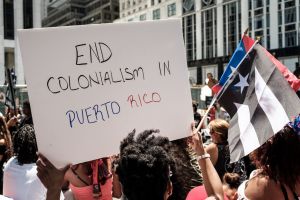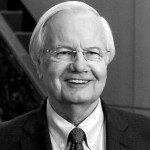Puerto Rico is devastated. Two hurricanes plunged the island into darkness and despair. Crops perish in the fields. The landscape of ruined buildings and towns resemble Hiroshima after the atomic bomb was dropped on it. Over 3 million people are desperate for food, water, electricity and shelter.
After a slow start, the Trump administration is now speeding up the flow of supplies to the island. A top US general has been given command of the relief efforts. And, like so many others, Yarimar Bonilla watches with a broken heart as her native Puerto Rico struggles. This noted social anthropologist — a scholar on Caribbean societies — says the hurricanes have made an already bad fiscal and economic crisis worse, and she sees darker times ahead unless major changes are made in the structure of power and in Puerto Rico’s relationship with the United States.
Last night on NBC, San Juan Mayor Carmen Yulín Cruz made a spontaneous statement expressing her frustration with insufficient relief efforts that went viral. Before you read my interview with Yarimar Bonilla please take two minutes to watch this video. You will understand even more clearly Ms. Bonilla’s explainer of what is happening in Puerto Rico.
— Bill Moyers
San Juan mayor pleads for federal help after hurricane: "We are dying here"
Read more: https://t.co/MaHffyRIKK pic.twitter.com/LPqpXaFP21
— NBC News (@NBCNews) Sept. 30, 2017
Bill Moyers: What’s the first thing you would want us to know about Puerto Rico?
Yarimar Bonilla: That it is a US territory — as are the Virgin Islands, American Samoa and Guam. That it has a greater population than 21 other states — more residents than Utah, Iowa or Nevada — and is geographically larger than Delaware or Rhode Island.
However, rather than wanting folks to know something in particular, I would want them to ask why is Puerto Rico part of the United States, to investigate the question and come up with their own answers. I think it would be more interesting for people to start out wherever they are — be it with no knowledge at all — or people who grew up in Puerto Rico and have long lived this political relationship without fully understanding it, to ask themselves why the island is part of the United States and what explains the particular ambiguity of its situation today.
Moyers: What’s your personal connection to Puerto Rico, and how did you come to devote so much of your life to studying Caribbean societies?
Bonilla: I was born in Puerto Rico, although my mom says that I can choose if I want to be an Island Puerto Rican or a Diasporican because now I’ve spent pretty much equal time in the United States and in Puerto Rico proper.
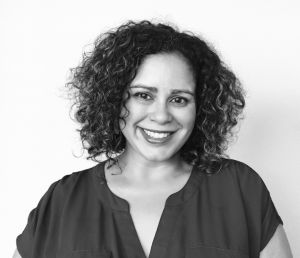
Yarimar Bonilla
Moyers: I dare say that until the hurricanes the popular image of Puerto Rico in this country was the epitome of prosperity. You know, all the ads on television and in magazines touting pleasure and escape — the resorts, the bright sun, the white beaches, the blue water, the rum and tonic, the sexy bikinis, the smiling locals.
Bonilla: Well, it’s funny, I had a colleague, a fellow anthropologist, with whom I joked about wanting one day for us to write an ethnography of the Puerto Rico that exists in tourist ads. Because it’s a place that we’ve never really visited or known.
Moyers: But doesn’t this distorted view make it more difficult for regular Americans to connect to the devastation today?
Bonilla: Perhaps. But I think even more than the tourist ads, what makes it difficult for Americans to connect is the deep ignorance that exists about the political relationship between Puerto Rico and the United States. Most folks in the US don’t even know how to orient themselves towards Puerto Rico. How should they feel about it? Should they support statehood, should they support independence? They’re unable to reconcile the political history of Puerto Rico with the history that they are taught in schools about the United States.
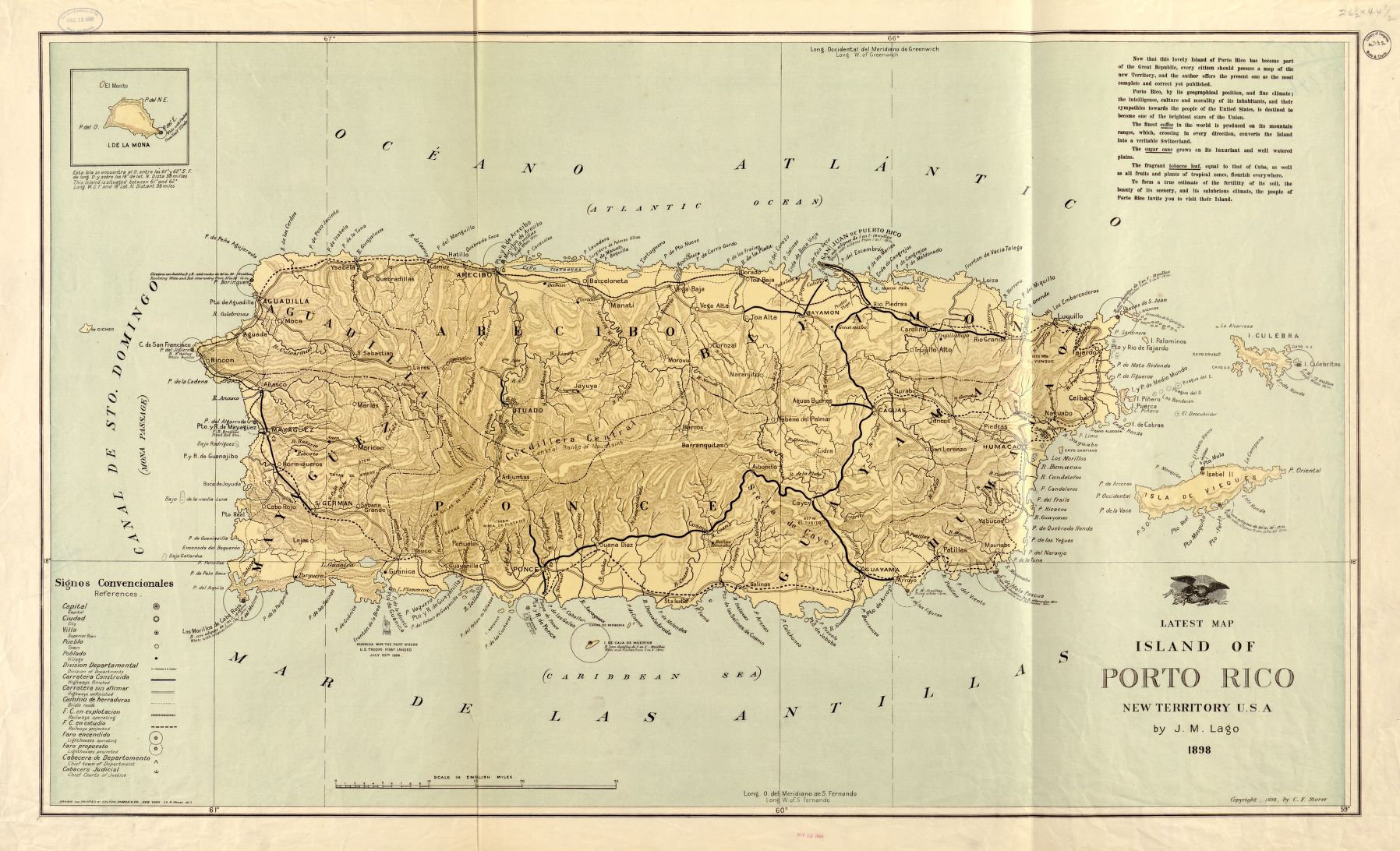
Latest map of island of Porto[sic] Rico, new territory USA, 1898.
(Image courtesy of the Library of Congress)
Moyers: You’ve said that Puerto Rico was in trouble long before the hurricane.
Bonilla: Puerto Rico’s been in an economic recession for over a decade. The great American recession that was so debated in the United States during the early Obama administration after the collapse of the banks in the US — all of that started in Puerto Rico much earlier, and whereas the US is said to have recovered to some extent for certain populations, Puerto Rico’s recession has only deepened. That is in part due to the lack of a strong economic base and to tax incentives that were put in place to bring foreign — “foreign” meaning US companies — to Puerto Rico. After the crash a lot of companies left and a base of employment in Puerto Rico was gone.
So even before this last hurricane, already Puerto Rico had huge unemployment, huge poverty rates — poverty rates that double any poverty rate in the US, even that of the poorest states of the US — and a very neglected infrastructure that was not ready for the storms.
Moyers: Donald Trump tweeted, “Texas and Florida are doing great after their hurricanes, but Puerto Rico, which was already suffering from broken infrastructure and massive debt, is in deep trouble.” And that seems to echo what you’ve just said and what you wrote in The Washington Post — that a state of emergency existed well before the hurricane hit.
Bonilla: I’m curious about that statement from Donald Trump. I wonder who in Florida and Texas is doing great and who is not. So that would be my first question. But you know, that’s for other folks to answer.
Moyers: Why was the inequality in Puerto Rico so great?
Bonilla: Because there’s been an erosion of the middle class. And so you have a lot of people at the bottom who can’t find work, who can’t start their own businesses. Many of them depend on government assistance, but there’s also a huge number who are working poor, who live paycheck to paycheck, who are supplementing their incomes with the gig economy. Retailers like Walmart offer no job security. Most of the people working for them can’t predict their shifts — their shifts change from week to week. They have to keep their schedules completely open. They are paid for part-time labor, but have to be available full-time.
And so all of this means that leading up to the storm, people already did not have enough money to prepare, to buy the supplies that they needed. Ideally, you would prepare for a storm of this nature by having a well-stocked pantry, plenty of water, lots of batteries, and if you can afford it, a generator. Also, your car would be full of gas and you would have a good amount of cash, because as can be expected and as we’re seeing now, ATMs are down. People who are just making ends meet, they don’t have the kind of money that is necessary to prepare for these storms.
There’s a lot of talk about the island’s environmental precarity and vulnerability. It’s true that the Caribbean is on the front lines of effects from climate change. But there are other forms of vulnerability, like socioeconomic vulnerability. And also a political vulnerability because Puerto Ricans don’t really have anyone in Congress advocating for them. They’re nobody’s constituents. They have no representation and no one who can leverage votes and trade deals with other states in order to get things expedited on the ground there.
Moyers: You’ve described these Caribbean societies, including Puerto Rico, as protected markets for national corporations.
Bonilla: Yes. If you look at the Jones Act, the only goods that can arrive in Puerto Rico have to be on US-made ships, and owned by US citizens, with a US crew flying a US flag. So this means that if the Dominican Republic wants to sell food to Puerto Rico, which it does, it has to send that food first to Jacksonville, Florida, unload it, put it on another ship that is allowed to bring it to Puerto Rico. So this makes it very difficult for Puerto Rico to engage in trade with other countries. We’re not an independent nation, so we can’t make our own trade arrangements. And that means that we have to buy mostly from the US.
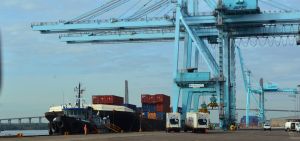
Sea Star’s new barge service to Puerto Rico out of Jacksonville will carry both dry and refrigerated containers. (Photo by JAXPORT/ flickr CC 2.0)
Moyers: I understand the Jones Act goes way back to World War I, when German submarines were sinking so many American ships that Congress decreed the US maintain a shipbuilding industry second to none, with, as you say, ships carrying provisions to be owned, manned and built by America. This not only strangles Puerto Rico’s economy, but one writer called it a shakedown, a mob protection racket, with Puerto Rico as a captive market. Puerto Ricans have to buy mainly American products and pass the higher cost on to the consumers, who are then paying higher prices. Donald Trump has temporarily suspended the Jones Act, as you know.
Bonilla: That will help momentarily in terms of letting a few ships arrive and letting Puerto Ricans find more inexpensive methods of procuring the items that they need right now. A lot of us are very offended that it was only lifted for 10 days, as if you could resolve the humanitarian crisis in Puerto Rico, which is of a devastating scale — as if you could resolve that in 10 days. It’s absolutely offensive for it to be so limited. A small crumb.
What I hope is that there are now a lot of people who have become educated about the Jones Act. Most people in the United States didn’t know anything about it before this. Maybe now there can be enough pressure to fully repeal it.
Moyers: You have described Puerto Rico and the other Caribbean societies as important economic cover for their colonial centers. What do you mean?
Bonilla: I mean that a lot of things happen in these places that aren’t supposed to happen — that’s what I mean by cover. The United States can claim to offer certain kinds of guarantees to its citizens, but those guarantees are suspended when it comes to the Virgin Islands and Puerto Rico. So veterans benefits are less, guarantees of health care are less, guarantees of public education — all these things are reduced. And in addition, wealthy people who are supposed to pay their share, they’re able to completely evade their taxes and not contribute to the national interest by setting up companies in Puerto Rico.
Moyers: So things were really made worse by tax incentives to wealthy investors. I believe Puerto Rico’s Act #22 allows wealthy investors to evade both federal and local income tax by spending a minimum of 183 nights a year on the island.
Bonilla: Yes, it’s true. It’s hard to comprehend, but it’s true. You have a lot of wealthy Americans who say, “Oh, this is great for us, it’s the thing that can get you out from under the US Internal Revenue Service without having to renounce your citizenship.” So they retain their American voting rights, they retain all their benefits of US citizenship, but they do not contribute anything to the US, nor do they contribute anything to Puerto Rico because they’re also not paying local taxes.
Moyers: How did Puerto Rico get its unique privilege to offer triple tax-exempt bonds?
Bonilla: It’s basically written into its constitution. When Congress established Puerto Rico’s civil government in 1917 it decreed that any bonds issued by its government would be free from taxation. In addition, it is written into the 1952 constitution that the repayment of any kind of public debt must take priority over financing public services. In 1952, when Puerto Rican politicians tried to convince Puerto Ricans that they were no longer a colony, and they convinced the United Nations to take Puerto Rico off the list of non-self-governing societies, this constitution was put into place and one of its founding principles was that Puerto Rico was going to be a site for US economic investment. And so you can purchase these triple tax-exempt bonds and not pay any federal tax, any tax in Puerto Rico, or any tax in the municipality in which you live. This made these bonds incredibly seductive for US. I urge everyone to read the great story in The New York Times “The Bonds That Broke Puerto Rico.”
Moyers: Earlier this year Puerto Rico officially became the largest bankruptcy case in the history of the American public bond market. In another tweet Trump points out how indebted Puerto Rico is to Wall Street and the banks and reminds Puerto Ricans that it “sadly must be dealt with.” He’s acknowledging this is the first thing Puerto Rico taxpayers have to do.
Bonilla: It was so offensive. Puerto Ricans have been kicked by Irma, then kicked by Maria, and now kicked by Trump. We’re really suffering. In the middle of our humanitarian crisis, he tells us, “It’s a shame but you have to pay back that debt.” It’s clear that was a message to Wall Street not to worry, they’ll get paid back. Puerto Ricans need to worry, however.
Moyers: Something I’ve learned from you: Walmart and Walgreens have more stores per square mile in Puerto Rico than anywhere else in the world. How did that come about?
Bonilla: Walmart has negotiated a series of benefits from the Puerto Rican government such as free or subsidized land to build on, subsidies for their payroll, and for the training of new employees. So they basically get to set up shop almost for free. In addition, we are a captive market. There’s not a lot of competition for them. So they’re the biggest employer, and the biggest retailer. Also, Walmart USA sells to Walmart Puerto Rico, at surprisingly inflated prices so that then it appears as if Walmart Puerto Rico doesn’t have much profit, which means they pay very little taxes to the Puerto Rican government.
The Puerto Rican government wanted to raise the taxes but Walmart threatened to sue and leave and then a federal judge decided that the tax would be discriminatory because Walmart was the only operator of the scale to which these taxes would apply.
Moyers: So when the government tries to raise taxes on goods brought to the island from foreign sources because those taxes would help local improvement, the companies threaten to leave?
Bonilla: Yes, exactly. They don’t want to pay the government any of the profits that they’re making off the Puerto Rican people.
Moyers: So does this helps explain why the infrastructure in Puerto Rico has been so long neglected — the first priority is to serve this foreign debt and tax breaks for the wealthy?
Bonilla: Absolutely, and it’s only going to get worse because of the PROMESA Act [NB: Passed by Congress to deal with the financial crisis and bankruptcy]. Some critics have dared to describe it as a kind of bailout or aid package, but that’s not so. There is absolutely no transfer of money from the federal government to Puerto Rico as part of the PROMESA Act. If anything, there’s an imposition of an economic burden on the Puerto Rican government which now has to pay the overhead of the PROMESA board — which is estimated to cost $200 million in its first year alone — and an astronomical, unjustifiable salary of over half a million dollars a year to its manager Natalie Jaresko. This completely overpaid expensive board arrives in Puerto Rico and the first thing that they say is that everyone has to tighten their belts. There are “furloughs” of government workers, the government has to reduce its payroll by about 30 percent. Now they are going to privatize a lot of the services. The first target was the University of Puerto Rico, which they completely gutted leading to a massive strike at the university.
Moyers: And as you wrote in The Washington Post, the PROMESA Act imposed a fiscal control board focused on the short-term austerity policies in order to restore the country’s market rating, which means lower wages and tax increases for the working poor and tax breaks and other incentives for the rich investors. Why did Congress do that?
Bonilla: They didn’t want to seem like they were “bailing out” quote/unquote a community of people who are not imagined to be Americans. So a lot of senators and congressmen wanted to assure their folks in their home states that the money of hardworking Americans were not going to bail out Puerto Ricans, who are not seen as “Americans.” That’s the reason. [laughs]
Moyers: You laugh, but it hurts.
Bonilla: Absolutely, absolutely. One must laugh to keep from crying in the face of such cynicism. And especially right now in the moment of this crisis where a lot of people are saying that Puerto Rico does not deserve the same kind of aid that US states deserve — Florida and Texas, you know — because it’s a territory. There’s also been a lot of debate about whether when you get FEMA packages, the government will do matching funds. So several folks have asked for the government to lift that requirement. The bondholders of the electric company, said, “Oh, don’t worry, we’ll let you borrow more so that you can pay the matching funds.” Clearly the only solution being imagined for Puerto Rico’s economic future is permanent and sustained indebtment.
Moyers: Well, our federal government’s own financial control board is saying that the island’s debt is not payable, and the governor of the island of Puerto Rico is talking about selling all utilities to private owners — electricity, water and sewers, the public transit. Will these drastic measures help the problem?
Bonilla: Absolutely not. Some have described these privatization schemes as if you are selling off your house to pay your credit card bill. So okay, you do a fire sale on your home, you pay your Visa, you pay your MasterCard, but then you have nowhere to live. Then what do you do? I think some people have been so frustrated with the kind of public services they’ve been receiving from this ever-shrinking government that they say, “Yes, okay, let’s privatize it.” But privatizing is not going to make things any better and it’s certainly not going to help Puerto Rico in the long term.
We talked previously about inequality and about the high levels of income disparity in Puerto Rico. This means that there are very wealthy people who to a great extent don’t need public services. They have gas generators and water tanks. Some of them even have helipads. The people who need the government services are the poor. They’re the ones who are going to suffer the most. So instead of implementing progressive measures that tax the wealthy in Puerto Rico, the opposite is being done.
Moyers: Trump is tweeting that help is coming. The Fiscal Oversight Board says reconstruction projects will be accelerated, emergency funds will be flowing to the people, the checks are in the mail. Will all this emergency help produce solutions to the structural problems we’ve been talking about? Will Puerto Rico emerge with chances for an economy that works for everyone?
Bonilla: I would love to say yes. I was very closely connected to the events in Haiti, the Haitian earthquake there. And I remember how so many people talked about how we were going to rebuild Haiti better, we were going to finally fix the long structural problems that that country had faced. This wasn’t to be. I recommend people watch this movie by Raoul Peck, Fatal Assistance, about how all the aid that was sent to Haiti, in the end it did not help.
One big problem is that donors want to aid small scale organizations. And there’s good reason for that. But the problem is, that when you need to rebuild something like an electricity grid or a public water system, you can’t do it in a patchy way. In Haiti, a lot of money was sent to organizations like the Red Cross that was kept for overhead and not used for what was promised. But then a lot of people, to avoid that kind of thing, would send money directly to a community that would build just one school. So you have this kind of patchy education system. You have communities that have wells that don’t connect to each other. You have roads that are built to go from one town to the church that helped build them but that doesn’t lead to a national roadway system. What you need is a systematic process of rebuilding by a government that has decided what kind of society they want to rebuild and in what way.
If you also look at a place like New Orleans and what has happened after Katrina, we know already that in other disaster situations, the preexisting inequalities just get exacerbated. And so the folks who were already suffering the most in these places are the ones who will benefit the least from the reconstruction.
I really fear that there’s going to be a mass exodus from Puerto Rico — basically what Aimé Césaire once described as genocide by substitution. Puerto Ricans are going to leave and FEMA workers brought in from the US are going to arrive. More wealthy investors are going to come and Puerto Rico is no longer going to belong to Puerto Ricans. It will look more and more like Hawaii. When we talk about rebuilding we have to think about why rebuild an energy sector that is not based on renewable sources when you can rebuild with solar power, for example. But we also have to think about rebuilding for whom, who is going to remain on the island and what role are they going to play in Puerto Rico’s reconstruction?
Moyers: Have you read Naomi Klein’s writing about “disaster capitalism”?
Bonilla: Absolutely, and we see it playing out. We see it playing out right now. When I was in Puerto Rico this summer — before the hurricanes — I talked to a wealth adviser at an investment center where rich Puerto Ricans go to create college funds for their kids and buy insurance and secure their retirements. She was very smart. Folks like her working in the banking industry and in investment and knew that bankruptcy and fiscal austerity was coming down the pike. The story was underreported so that there wouldn’t be a bank run. But folks like her told their clients to pull their money out of Puerto Rican bonds and put it into other sources. Most of her clients, their investments are in US stocks. So she said, “They’re doing great! Since Donald Trump was elected, stocks are high.” And then she said, “All we need now is a hurricane.” (Pause) This was last summer. I was naturally shocked to hear this because all I could imagine was the destruction that hurricanes bring. But of course what she was thinking about was how in a disaster the funds that flow in help precisely the kind of companies that her clients are investing in — say, Home Depot, the construction industry in the United States, wealthy contractors. She represents the kind of people who are going to benefit and profit and do very well in this post-hurricane economy at the expense of the folks who are now trapped in their homes without food, without water, without gasoline. So the suffering that people are experiencing right now could prove to be of economic benefit to a chosen few.
Moyers: The vulture capitalists, as they are sometimes called.
Bonilla: Absolutely. There’s no other way to talk about it, especially in a context where you literally have people dying in the hospital because there’s no energy to sustain their life-support systems.
Moyers: Most of us have a little bit of the vulture in us, so the question arises, who’s at fault when this happens? Did local politicians and local people just get too greedy or is this simply the way the Wall Street economy works — barracuda capitalism, so called? Or is what’s happening in Puerto Rico the inheritance of colonialism?
Bonilla: That’s an important question and something that really needs to be thought about carefully because there are so many contributors. We like to write simple articles that show simple causality, but you have wealthy folks like this investment manager, who is Puerto Rican, contributing to the situation. You have politicians — we see this in every disaster — you have politicians who are more focused on photo ops and political capital than they are really in doing what needs to be done in these moments.
I think one thing that has been really problematic in Puerto Rico is the way that the political parties are organized. They’re organized around the relationship to the United States. So some folks describe this as a kind of left/right political spectrum with independence on the left, statehood on the right and advocates of commonwealth status fashioning themselves as a kind of centrist party. There’s some truth in this description but it’s complicated because within the statehood party you have folks who are progressive, who supported Bernie Sanders, for example. You have folks who see statehood as a form of decolonization, who see it as the possibility of greater solidarity with continental US minority groups. Similarly, even though there is a very progressive pro-independence sector, when you look at what nationalist elites have brought to other Caribbean nations, and the kind of racial and economic disparities that characterize independent nations across the Americas, one can see that independence is not a guarantee of progressive politics.
My hope is that because this is such a deep political crisis, it will generate more than a banal optimism that simply says “Oh, let’s build better,” and stops there. I hope that it will lead to a profound grass-roots social movement — a movement of people sick of the government and sick of the limits of the political relationship that Puerto Rico has with the United States, which produced a delayed response by Washington to the devastation after the last hurricane.
Perhaps right now, when people feel so exposed, so left out in the rain, literally, by the US government, we might get a push for a political change.
Moyers: The journalist Kate Aronoff reminds us Puerto Rico suffered from two massive storms many years ago, one in 1928 that is still considered the second deadliest natural disaster in US history, and another in 1932 that killed over 250 people and destroyed more than 40,000 buildings. Between those two disasters the stock market collapsed and Puerto Ricans were knocked off their feet, like so many others. But they got up and with the help of the New Deal, they came back. What do you see as the path to recovery now?
Bonilla: I’m so excited you brought up those two storms. Indeed, the enactment of the New Deal and the assistance the United States was able to provide Puerto Rico at that time paved the way for the establishment of the commonwealth status. At that time many Puerto Ricans felt the new relationship with the United States would be good for them. Not only because it happened as the New Deal grappled with the Great Depression but it happened at a moment when Puerto Rico had the strongest momentum in terms of the nationalist movement. In addition, the storm totally wiped out local crops and devastated farmers. As a result they were encouraged to sell their lands to the US government and to US corporations, which is part of why we ended up where we are now, importing most of our food on these very expensive ships — we no longer have food sovereignty.
With this current storm I have been wondering if this will be a moment in which, as the farmers did back then, we will just sell everything off and privatize the rest of what we have. However, here’s where the US government’s response and Trump’s response could lead in a completely different direction if people realize that that United States does not in fact see us as part of the nation, does not see us as full Americans worthy of aid, does not think that our lives matter, literally. When Hurricane Harvey hit the Gulf Coast, Trump quickly suspended the Jones Act so that oil could be supplied to the pipelines; he did it immediately. After Irma hit Puerto Rico, however, it took eight days for the president to even consider suspending it, and he only did so for ten days, for an island completely dependent on importing its food. I think this has made it really clear for Puerto Ricans where they stand in terms of US priorities.
Ms. Bonilla teaches at Rutgers University in New Jersey and is a visiting scholar at the Russell Sage Foundation. She is the author of the book Non-Sovereign Futures: French Caribbean Politics in the Wake of Disenchantment, and one of the founders of the Puerto Rico Syllabus, a bilingual source of research available to the public and used especially by teachers and students who wish to know more about the island commonwealth. This interview has been edited for brevity and clarity.

